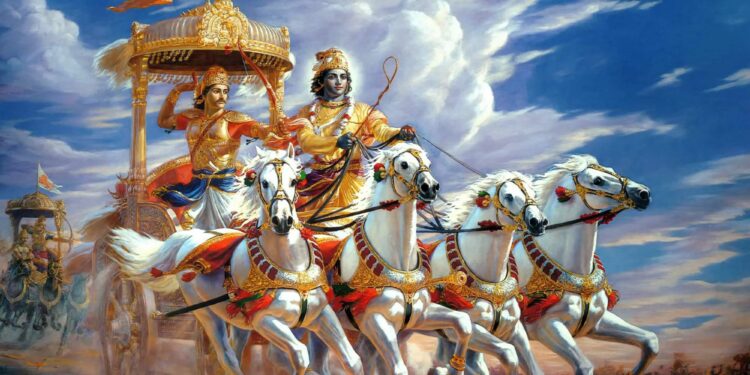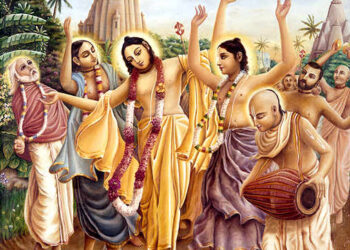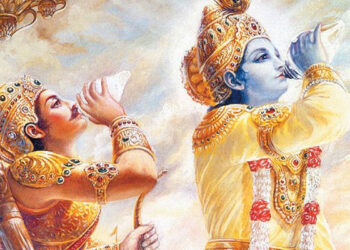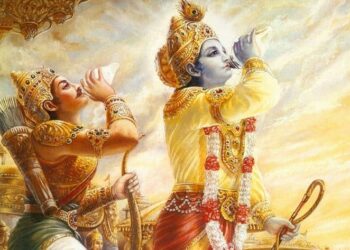TEXT 69
yā niśā sarva-bhūtānāṁ
tasyāṁ jāgarti saṁyamī
yasyāṁ jāgrati bhūtāni
sā niśā paśyato muneḥ
SYNONYMS
yā—what; niśā—is night; sarva—all; bhūtānām—of living entities; tasyām—in that; jāgarti—is wakeful; saṁyamī—the self-controlled; yasyām—in which; jāgrati—are awake; bhūtāni—all beings; sā—that is; niśā—night; paśyataḥ—for the introspective; muneḥ—sage.
TRANSLATION
What is night for all beings is the time of awakening for the self-controlled; and the time of awakening for all beings is night for the introspective sage.
PURPORT
There are two classes of intelligent men. One is intelligent in material activities for sense gratification, and the other is introspective and awake to the cultivation of self-realization. Activities of the introspective sage, or thoughtful man, are night for persons materially absorbed. Materialistic persons remain asleep in such a night due to their ignorance of self-realization. The introspective sage remains alert in the “night” of the materialistic men. The sage feels transcendental pleasure in the gradual advancement of spiritual culture, whereas the man in materialistic activities, being asleep to self-realization, dreams of varieties of sense pleasure, feeling sometimes happy and sometimes distressed in his sleeping condition. The introspective man is always indifferent to materialistic happiness and distress. He goes on with his self-realization activities undisturbed by material reactions.
TEXT 70
āpūryamāṇam acala-pratiṣṭhaṁ
samudram āpaḥ praviśanti yadvat
tadvat kāmā yaṁ praviśanti sarve
sa śāntim āpnoti na kāma-kāmī
SYNONYMS
āpūryamāṇam—always being filled; acala-pratiṣṭham—steadily situated; samudram—the ocean; āpaḥ—waters; praviśanti—enter; yadvat—as; tadvat—so; kāmāḥ—desires; yam—unto whom; praviśanti—enter; sarve—all; saḥ—that person; śāntim—peace; āpnoti—achieves; na—not; kāma—kāmī—one who desires to fulfill desires.
TRANSLATION
A person who is not disturbed by the incessant flow of desires—that enter like rivers into the ocean, which is ever being filled but is always still—can alone achieve peace, and not the man who strives to satisfy such desires.
PURPORT
Although the vast ocean is always filled with water, it is always, especially during the rainy season, being filled with much more water. But the ocean remains the same—steady; it is not agitated, nor does it cross beyond the limit of its brink. That is also true of a person fixed in Kṛṣṇa consciousness. As long as one has the material body, the demands of the body for sense gratification will continue. The devotee, however, is not disturbed by such desires, because of his fullness. A Kṛṣṇa conscious man is not in need of anything, because the Lord fulfills all his material necessities. Therefore he is like the ocean—always full in himself. Desires may come to him like the waters of the rivers that flow into the ocean, but he is steady in his activities, and he is not even slightly disturbed by desires for sense gratification. That is the proof of a Kṛṣṇa conscious man—one who has lost all inclinations for material sense gratification, although the desires are present. Because he remains satisfied in the transcendental loving service of the Lord, he can remain steady, like the ocean, and therefore enjoy full peace. Others, however, who want to fulfill desires even up to the limit of liberation, what to speak of material success, never attain peace. The fruitive workers, the salvationists, and also the yogīs who are after mystic powers are all unhappy because of unfulfilled desires. But the person in Kṛṣṇa consciousness is happy in the service of the Lord, and he has no desires to be fulfilled. In fact, he does not even desire liberation from the so-called material bondage. The devotees of Kṛṣṇa have no material desires, and therefore they are in perfect peace.



















